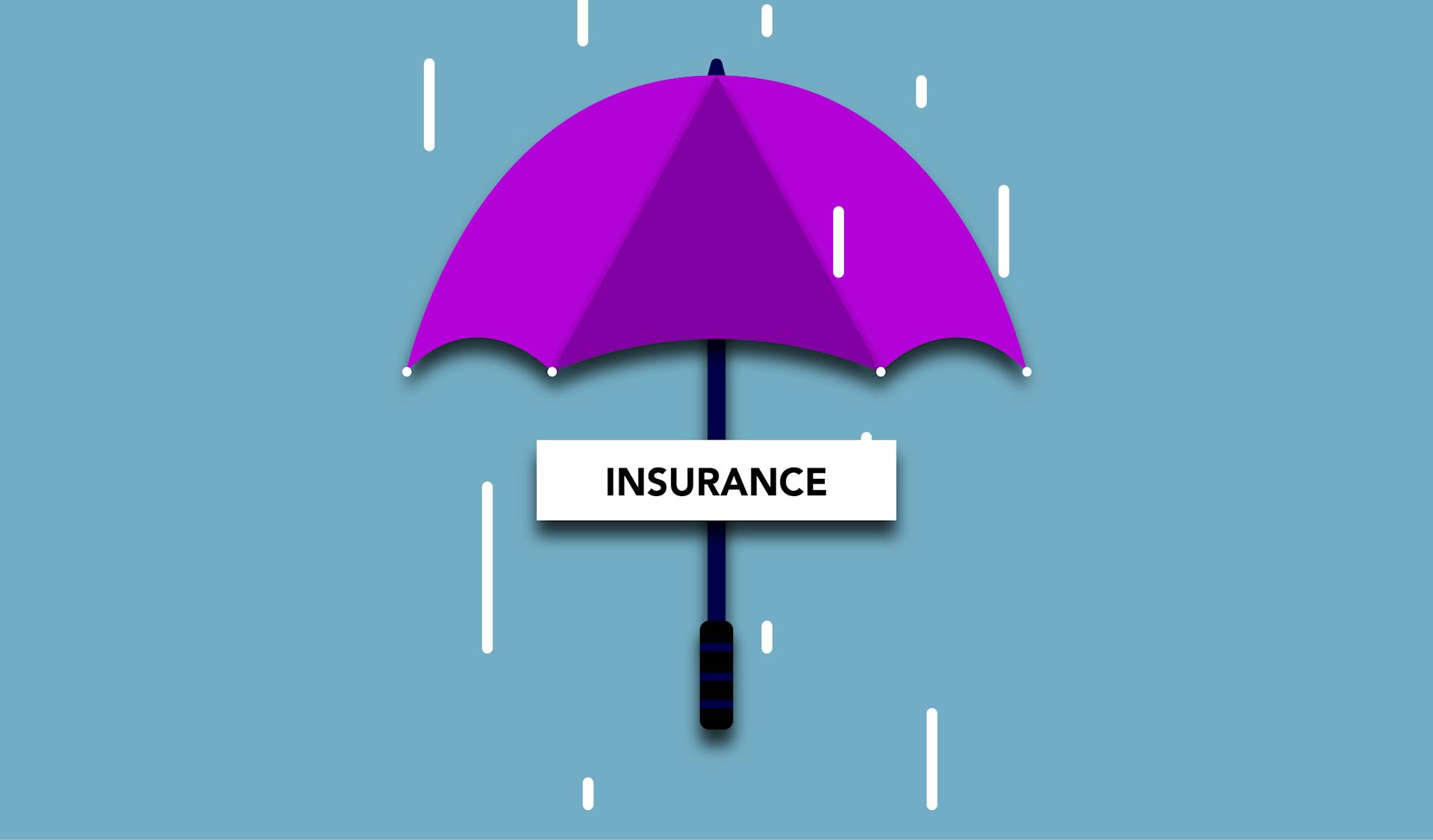
To get the most out of umbrella insurance, consider this simple rule of thumb: match your umbrella policy's limit to your net worth. This will give you the maximum protection against lawsuits and other financial risks.
For example, if you have a net worth of $500,000, consider an umbrella policy with a $500,000 limit. This will ensure that your assets are fully protected in case of a lawsuit or other financial disaster.
Having an umbrella policy with a limit that's too low can leave you vulnerable to financial ruin. On the other hand, having a policy that's too expensive may not be worth the cost.
See what others are reading: Settling with Discover Card
What Is Umbrella Insurance?
Umbrella insurance is a type of personal liability coverage that protects you and your family from large claims or lawsuits that go above your homeowners, auto, and even boat insurance policies' liability limits.
It's essentially the same thing as an umbrella policy, which is designed to kick in when the liability specified in your homeowners or automobile insurance has been exhausted.
Umbrella insurance covers your money by filling the financial gap that your primary liability insurance doesn't cover.
This means if you're sued and your auto insurance only covers $100,000, you'll have protection for anything above that.
Lawsuits are fairly common, and juries and judges often award large sums of money for incidents at home or while driving, making umbrella insurance a valuable extra protection.
You might enjoy: Cheap Income Protection Insurance
Who Needs Umbrella Insurance?
If you have significant assets to protect, umbrella insurance is worth considering. For most individuals, the cost is negligible and provides an additional layer of peace of mind.
You should consider an umbrella policy if you have more assets than liability coverage from your homeowners and automobile insurance. This is a common scenario where an umbrella policy can cover the difference.
If you have $700,000 in assets and your auto insurance only covers you for $300,000 per accident, an umbrella insurance policy can protect your other $400,000 of assets. This highlights the importance of having adequate coverage.
On a similar theme: Home Business Insurance Coverage Endorsement

Your insurance provider may require you to increase your coverage before letting you purchase umbrella insurance. Typically, they will require Bodily Injury Coverage of $300,000 and Property Damage of $300,000.
Having high income or expecting to have high income in the future are good reasons to own an umbrella insurance policy. Significant assets are also a good reason to consider umbrella insurance.
For your interest: Liberty Mutual Umbrella Insurance Coverage
Key Considerations
As you consider umbrella insurance, it's essential to think about the potential risks and liabilities that could impact your financial security.
You may be surprised to learn that a single lawsuit can quickly exceed the limits of your standard insurance policies, leaving you vulnerable to financial ruin.
To mitigate this risk, consider the average cost of a lawsuit, which can range from $100,000 to $1 million or more, depending on the circumstances.
When evaluating your umbrella insurance needs, it's also crucial to think about the value of your assets and how they could be impacted by a lawsuit.
Expand your knowledge: Frivlous Civl Lawsuit Will Umbrella Insurance Protect Me
What's Missing?

Many umbrella insurance policies specifically exclude certain types of lawsuits, such as malpractice lawsuits and workers compensation claims against employers.
Business-related activities are also often excluded, including damage caused by a business or any business-related activity.
Umbrella insurance only covers accidental damage, not damage caused intentionally.
It's essential to understand what's not covered to make informed decisions about your policy.
If you're hurt or your property is damaged, umbrella insurance won't help cover expenses.
This is a crucial aspect to consider when determining how much umbrella insurance you need.
A common rule of thumb is to get a policy equal to your net worth, but this can be problematic for people with low net worth and high future earning potential.
People can still sue for more than your net worth, and serious injuries like a child becoming a quadriplegic can result in extremely high expenses.
Ultimately, how much umbrella insurance you need comes down to how much you're willing to risk.
Additional reading: Prepaid Expenses in Quickbooks
Common Mistake in Decision-Making
A common mistake people make in deciding whether to purchase umbrella insurance coverage is only looking at their net worth. This is a mistake because it doesn't take into account current income, future earning potential, and other factors that can impact liability.
For example, a doctor in residency making $60,000 a year may have a negative net worth due to student loans, but they have high income potential, such as making $500,000 a year in a few years. This is why it's essential to consider these factors when deciding to get umbrella insurance.
Here are some scenarios where it could make sense to have an umbrella insurance policy:
- Own a home
- Own a rental property
- Have high income or expect to in the future
- Have savings and assets
- Worried about lawsuits
- Have kids
- Own a dog
- Have a trampoline, pool, or other high risk structure
- Entertain people in your home
- Have more publicly available information about yourself
- Participate in activities that are more likely to injure others (ski, surf, hunt, etc.)
If you're reading this, there's a good chance you'd benefit from having an umbrella insurance policy. It's cheap and can provide extra peace of mind.
Why Larger Amounts Can Help
Having a larger umbrella insurance policy can provide an added layer of protection against financial ruin in the event of a lawsuit.

The more coverage you can put between your assets and someone suing you, the less likely someone will be able to reach your assets.
For example, if you have a $5,000,000 policy and a personal injury attorney thinks you might have $3,000,000 in assets, they may be more interested in settling with the insurance company for an amount less than $5,000,000 if it can avoid a long, drawn out court battle.
Knowing an attorney provided by the insurance company is going to defend a lawsuit may be enough of a reason to get umbrella insurance coverage.
In some cases, insurance carriers use your umbrella insurance limits to hire and pay an attorney to defend you, while others pay attorney fees outside of your limits.
To give you a better idea, here are the annual costs for different levels of umbrella insurance coverage:
For most people, the peace of mind offered by having a little extra umbrella insurance can outweigh the incremental cost.
Calculating the Needed Amount

Consider taking stock of your assets, including your home, vehicles, investments, and savings, as this will be a crucial factor in determining your umbrella insurance needs.
The total value of these assets should be evaluated to ensure comprehensive protection.
A good rule of thumb is to consider the value of your assets and the potential risk of a lawsuit exceeding your primary insurance limits.
Many insurance companies offer umbrella insurance amounts between $1,000,000 and $5,000,000, with some going up to $10,000,000.
Some higher-end carriers offer umbrella insurance amounts above $10,000,000.
To calculate how much umbrella insurance you need, start by evaluating your assets and assessing your future earnings.
Assessing your lifestyle and associated risks is also crucial, as certain activities can increase your liability exposure.
Reviewing your existing insurance policies, including homeowners, auto, and other liability coverages, will help you understand the coverage limits.
Consult with an insurance professional to gain insights into your unique situation and get advice on suitable coverage amounts.
Explore further: Homeowners Insurance Provides What Two Basic Types of Coverage

Here's a rough guide to help you get started:
Remember, the goal is to provide additional protection beyond your primary insurance limits, so factor in your potential future earnings and lifestyle risks to determine the right amount of umbrella insurance for you.
Purchasing and Cost
Umbrella insurance is relatively inexpensive because the odds of using it are low. It's normally sold in increments of $1,000,000, with the first increment being the most expensive.
The cost of umbrella insurance varies depending on state, risk factors, and other variables. For example, if you have a pool, multiple teenage drivers, and a dog, your cost may be higher.
You can expect to pay around $150-$350 per year for the first $1,000,000 of coverage, and then each additional $1,000,000 of coverage might be $75-$150 per year.
Here's a breakdown of the estimated costs for different levels of coverage:
Umbrella insurance can be a key coverage for financial peace of mind, and it's relatively inexpensive compared to the coverage it provides.
Buying Policy

Buying a policy can be a bit tricky, but most carriers won't let you get a stand-alone umbrella insurance policy. You'll need to add it to an existing policy.
To qualify for umbrella insurance, you'll need to have a certain amount of liability in your other policies. Most insurance companies require $250,000 in auto insurance liability and $300,000 for your homeowners insurance.
You might need to pay more on your auto or home insurance premiums to get umbrella insurance, but it's usually worth it. It's like investing in a safety net for your finances.
You can bump up your home or auto liability limit pretty high, up to $1 million in some cases, but it's usually a better deal to buy the minimum required to qualify for umbrella insurance and then buy the umbrella.
Bundling your policies with the same provider can get you a discount, which is a nice bonus. An independent insurance agent can help you figure out if bundling is your best bet.
If you're sued, having both your policies under the same roof can make things easier, reducing your stress levels. You'll only have to deal with one insurance company instead of two.
Intriguing read: In Insurance Policies the Insured Is Not Legally
Purchasable Amounts

Umbrella insurance policies typically range from $1,000,000 to $10,000,000, with some carriers offering amounts above $10,000,000.
Some insurance companies offer umbrella insurance amounts between $1,000,000 and $5,000,000, while others may go up to $10,000,000 or more.
Higher-end carriers may offer umbrella insurance amounts above $10,000,000, making it essential to shop around for the best coverage.
Here's a breakdown of the typical umbrella insurance coverage amounts and their corresponding costs:
Coverage and Exclusions
Umbrella insurance doesn't cover everything, so it's essential to understand what's included and what's not.
Your umbrella insurance likely won't cover business activities, such as if a client visits you at home for business purposes and gets injured. You'll need specific business insurance coverage in this case.
Read the fine print and ask your insurance agent questions to avoid surprises. Common exclusions include intentional or criminal acts to cause damage, like punching your grandkids' soccer coach.
Business activities, intentional acts, and criminal acts are just a few examples of what umbrella insurance usually doesn't cover. Your injuries and damage to your personal property are also excluded.
Here are some examples of what umbrella insurance usually doesn't cover:
- Business activities
- Intentional acts
- Criminal acts
- Your injuries
- Damage to your personal property
- Other exclusions in your policy
Other exclusions may include specific dog breeds or activities, so make sure to review your policy carefully.
What Does Not Cover
Umbrella insurance doesn't cover everything, so it's essential to understand what it won't cover. You need to read the fine print and ask your insurance agent lots of questions to avoid any surprises.
Business activities are typically not covered by umbrella insurance. For example, if a client visits you at home for business purposes and gets injured, your umbrella insurance and likely your homeowner's insurance won't cover it.
Intentional or criminal acts to cause damage are usually not covered. If you get angry and punch your grandkids' soccer coach, the umbrella insurance probably won't help cover your lawsuits or injuries.
Umbrella insurance also doesn't protect your personal property. If your prized artwork at home is damaged, your homeowners insurance is likely to provide coverage, not your umbrella insurance.
Serving on a board of a company, condo association, or non-profit is usually not covered by umbrella insurance. You may need to add an endorsement or obtain directors and officers coverage.
For more insights, see: What Does Homeowners Insurance Cover and Not Cover
Other exclusions in your policy can also apply. For example, certain dog breeds may be excluded from an umbrella insurance policy. If you own a dog breed specifically excluded in the policy and it bites someone, you may not have protection.
Here are some key things that umbrella insurance usually doesn't cover:
- Business activities
- Serving on a board
- Intentional acts
- Criminal acts
- Your injuries
- Damage to your personal property
- Other exclusions in your policy
What Covers
Umbrella insurance covers two main areas: Bodily Injury or Property Damage, and Contractual Liability.
Bodily Injury or Property Damage coverage kicks in when the limits of other liability coverage lines are exhausted, covering physical injury or illness to a person, caused by your business activities, as well as damage, destruction, or theft of property belonging to a third party.
Contractual Liability coverage, on the other hand, deals with "insured contracts", such as leases and easements, and covers legal expenses arising from taking on the tort liability of another party.
Here are the two main umbrella coverages in more detail:
- Bodily Injury or Property Damage: This covers physical injury or illness to a person, caused by your business activities, as well as damage, destruction, or theft of property belonging to a third party.
- Contractual Liability: This covers legal expenses arising from taking on the tort liability of another party, specifically regarding "insured contracts" such as leases and easements.
Excess Liability vs
Excess liability and umbrella policies are often used interchangeably, but they're not exactly the same thing. Excess liability only increases the limit of one line of coverage, whereas umbrella coverage provides extra protection for several properties in multiple states.
To illustrate the difference, consider a real estate property in one city with a general liability policy. Excess liability can extend the coverage of this policy, but it's not the same as umbrella coverage, which provides extra protection for multiple properties across states.
The key to deciding between excess liability and umbrella coverage is understanding the distinction between the two. This will help you determine the right umbrella limits for your real estate investment portfolio.
Here's a quick rundown of the factors to consider when deciding between excess liability and umbrella coverage:
Importance and Benefits
Umbrella insurance provides an additional layer of protection beyond your existing policies.
It's especially important because many standard policies only provide limits up to $500,000, which may not be enough to cover a claim in a litigious society.
A fresh viewpoint: All Perils Are Included in Homeowners Insurance Policies
You might exhaust your property damage coverage quickly if you cause an accident that damages multiple high-end vehicles.
This is where umbrella insurance comes in, offering up to $2,000,000 of additional coverage to ensure you're protected.
With umbrella insurance, you can have a total of $2,500,000 of personal liability coverage, which could mean the difference between financial ruin and keeping your same lifestyle.
On a similar theme: 2 Million Umbrella Policy
Why Is Important
Having a reasonable lawsuit can still leave you with a significant financial burden. Many homeowners, auto, and watercraft insurances only provide limits up to $500,000.
We live in a litigious society, and even a reasonable lawsuit can exceed these limits. For example, if you cause an accident that damages multiple cars and injures multiple people, $500,000 may be nowhere close to enough.
In some cases, your personal liability coverage might not be enough to cover a claim. If you have personal liability coverage of $500,000 and a $2,000,000 umbrella insurance policy, your $500,000 of personal liability coverage would be used first, leaving you with up to $2,000,000 of additional coverage.
This extra layer of protection can make a huge difference in your financial stability. It's low odds you'll ever need to use the coverage, but if you do, it could mean the difference between starting over financially and keeping your same lifestyle.
Example of Importance

Having a nice home, good income, and expensive cars can make you a more attractive target for personal injury attorneys.
If you don't have these assets, the attorney may not take the case, making it harder to sue.
A personal injury attorney's decision to take a case often depends on the potential payout.
Having a nice home can increase the potential payout in a lawsuit.
Frequently Asked Questions
At what net worth should you have an umbrella policy?
Get umbrella insurance if your net worth exceeds $500,000 to protect your assets from unexpected lawsuits and financial losses
What are the disadvantages of an umbrella policy?
Umbrella insurance has limitations, excluding certain risks such as business-related liabilities unless a commercial policy is purchased. It's essential to understand these exclusions before deciding on an umbrella policy
How much is a $1 million dollar umbrella policy?
A $1 million umbrella policy typically costs around $383 per year, making it a relatively affordable way to boost your liability coverage. This annual cost is based on a standard policy for an individual with one home, two cars, and two drivers.
Sources
- https://www.affiancefinancial.com/news/umbrella-insurance
- https://www.ramseysolutions.com/insurance/how-much-umbrella-insurance-do-I-need
- https://kindnessfp.com/how-much-umbrella-insurance-do-i-need/
- https://reshield.com/blog/umbrella-limit-real-estate-investors/
- https://jackstoneinsurance.com/blog/how-much-umbrella-insurance-do-i-need/
Featured Images: pexels.com

